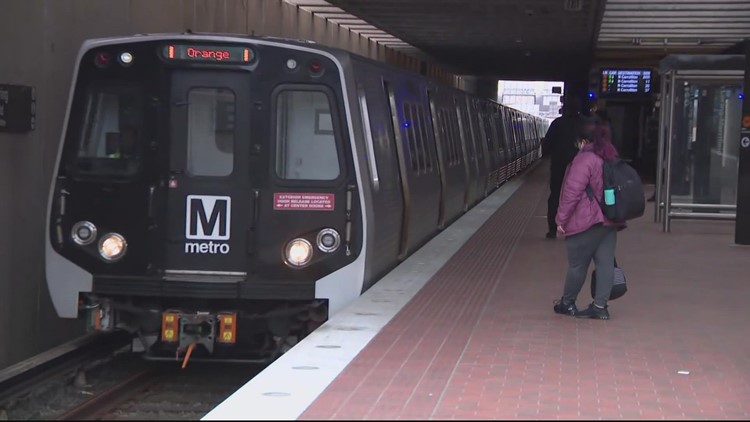WASHINGTON — Metro riders won't have to feel the reduced service effects to the Blue, Orange and Silver lines after an agreement was made to avert disruptions. WMATA made the announcement hours after saying service would be modified.
The original decision to reduce service came after safety watchdog Washington Metrorail Safety Commission (WMSC) sidelined more than 50 rail operators, the Washington Metropolitan Area Transit Authority (WMATA) said Monday.
Trains on those three lines of service were going to be reduced for customers from every 15 minutes to every 25 minutes beginning Tuesday through most of the week, but the last-minute agreement means they will run as usual.
"Metro customers will not experience rail service impacts that were previously announced and scheduled for Tuesday, Jan. 17 on the Blue, Orange, and Silver lines," WMATA said Monday afternoon. "Instead of 25-minute rail service on those three lines, trains will continue to arrive every 15 minutes."
WMATA added, "We appreciate the Washington Metrorail Safety Commission for their expedited review and stay of their directive related to rail operator training. Customers are the real winners in this process. We also appreciate WSMC’s commitment to timely consider our petition on moving to Phase 3 of our 7000-series train Return to Service plan. In the spirit of collaboration and transparency, Metro will continue the enhanced training for rail operators."
The move was being done to comply with directions received by WMSC on Friday evening, ahead of the holiday weekend.
“Safety is an absolute core value of Metro; however, we are exasperated with directives that are not based on risk analysis or facts,” said Chair Paul C. Smedberg. “The Board has tremendous confidence in the job our General Manager and his team of operations and safety professionals are doing, as evidenced by significant improvements we have seen in safe and reliable rail service.”
WMSC released a statement shortly after WMATA made the updated announcement:
"The WMSC has granted Metrorail a stay until January 24, 2023 of our directive requiring Metrorail to provide a list of train operators Metrorail certified despite not meeting Metrorail’s safety training requirements. Related investigation and inspection activities continue as the WMSC awaits documentation from Metrorail regarding new information Metrorail provided earlier today."
According to Metro, currently, the rail operator training program requires 17 weeks of combined classroom and on-the-job training for student operators with an instructor in the cab, for at least 38 hours. Which they said is more than required in several other cities.
“This action presumes that operators who have been recently certified are unfit for service,” said Metro Chief of Safety and Readiness Theresa M. Impastato. WMATA continued to state that is not the case as every operator has done their required 38 hours of instructor-supervised time in the cab and has passed an independent exam for certification. But the safety commission says while investigating why a train operator ran a red light it found Metro had been deliberately ignoring train operator training requirements, WMSC told WUSA9.
In another directive, on Friday, WMSC halted the October Return to Service agreement with Metro, which would allow more trains in service. The directive denied Metro the ability to move to the next phase in the 7000-series railcar Return to Service plan even though Metro satisfied all the conditions in the plan, and has had no documented 7K wheel movement since May 23, 2022, according to a release from Metro.
“While we fundamentally disagree with the WMSC’s directives, we will comply, as I will not put our customers in the middle of a bureaucratic process that fundamentally does not enhance their safety,” General Manager and Chief Executive Officer Randy Clarke said. “This arbitrary decision is especially frustrating considering that Metro is prepared to increase service on multiple lines over the next month, which is only possible with more 7K trains. Unfortunately, despite the incredible efforts of the Metro team, our customers should expect the current service levels for the foreseeable future.”
Metro has filed formal petitions for reconsideration of the WMSC directive that will stall the 7000-series Return to Service plan. In the petition, Metro states the agency has worked transparently, collaboratively, and side-by-side with the WMSC to track and share data on all 7000-series railcars, in 'exceedance' of the Return to Service Plan.
“We look forward to the WMSC’s timely review of the petition but there is really a larger fundamental issue that needs resolution,” Smedberg said. “The Board and staff are fully supportive of an independent safety oversight body; however, the relationship between WMSC and Metro is structurally untenable and does not advance the region’s mission of providing safe and reliable rail service.”



